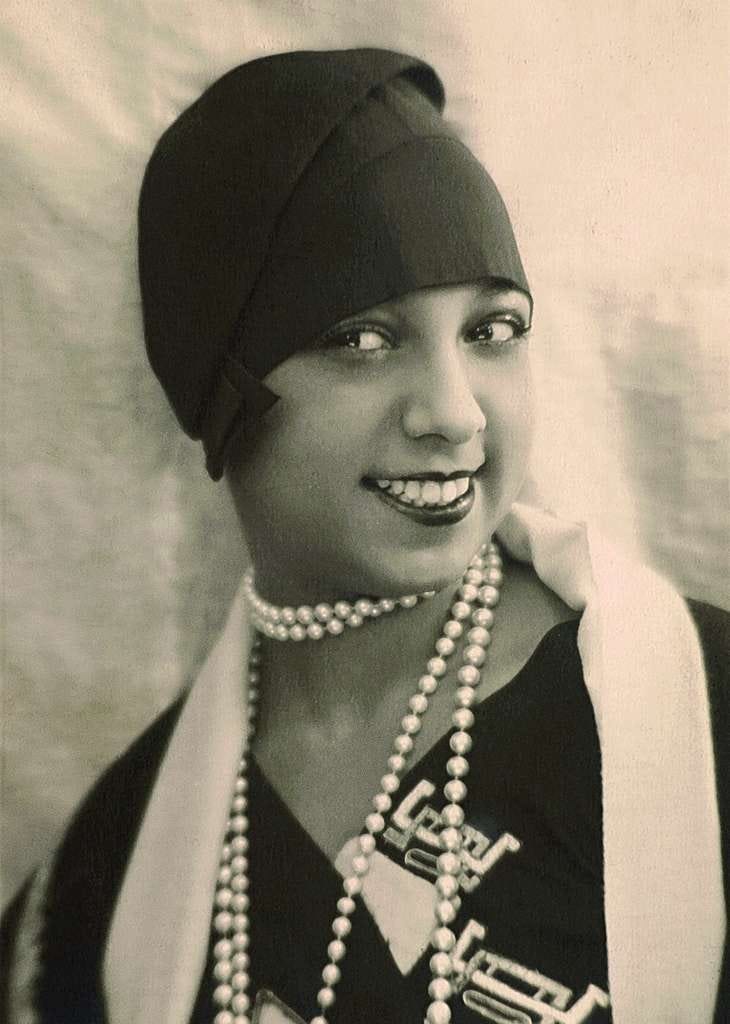Happy Super Bowl 2024! For those of you not into football, I hope you’ll consider this History With Hope as part of your counterprogramming. Other than tuning in for Taylor Swift sightings (glad you made it back from Japan, girl!) and Usher’s halftime show (gonna be a good one), I’ll be nose to the grindstone writing STARDUST, the sequel to IRISH EYES.
STARDUST, which will release August/September 2024, is largely set in World War II Paris. Along with Coco Chanel and Sylvia Beach, both of whom I wrote about here in previous posts, Josephine Baker (1906-1975) is emerging as a significant contributing character to the story.
Most of us know Baker as a boundary-busting singer-dancer who took Paris, and later Europe and the world, by storm with her risqué and now iconic “banana dance.”1 Baker was all that — and SO much more.
Freda Josephine Baker (née McDonald) was born in St. Louis, Missouri on June 3, 1906. Her childhood and youth were marred by poverty, racial violence, sexual abuse, and two teenage marriages.2 From everything I’ve read, what seemed to carry her through was an unflagging faith in her purpose as a performer.
Eventually Baker made her way to New York, performing in Harlem and on Broadway. The city and its racially-biased critics weren’t welcoming. In 1925, she seized the opportunity to join an all-Black musical review bound for France. It would be a game changer.
Baker arrived in Paris at a zeitgeist moment when many American writers, intellectuals, artists and entertainers had decamped to the City of Light, drawn by the legal booze (it was Prohibition in the States), creative freedom (practically no censorship), and a lower cost of living. (The dollar-to-franc ratio was also in expats’ favor). Parisians were obsessed with American jazz music and Black culture. There was no segregation onstage or off.
In 1926, Baker debuted her “danse sauvage” at the Champs-Elysees Theater in which she wore a short skirt of 16 rubber bananas and not much else.3 The audience went wild. A star was born.
A year later, Baker opened her eponymous cabaret, Chez Joséphine, in Montmartre.4 By then, she was accounted to be the wealthiest Black woman in the world. Money provides choices, and Baker chose to use hers to do tremendous good.
In 1939, as refugees from Nazi-occupied countries flooded France, she volunteered at a center for Belgian refugees, which she helped fund, all while keeping up her daily performance schedule. As a licensed pilot, she flew supplies for the Red Cross.5
On June 14, 1940, German tanks rolled into Paris, the beginning of a grueling four year occupation. Always insistent on performing to integrated audiences, Baker refused to go onstage though she kept her club open.
As an international superstar, she leveraged her connections in the Italian embassy6 to undertake intelligence work for the Duexième Burea, the French intelligence agency continuing covertly as part of the Resistance effort. Attending embassy parties, she wrote down the information she’d gleaned in invisible ink on her sheet music and passed it on to her handlers.
Throughout the occupation, Baker opened her château in the south of France, Les Milandes, as a hiding place for Jews and French Resistance fighters.7
From 1941 to 1944, she used the cover of her touring schedule in North Africa and elsewhere to transmit vital intel on Axis troop movements to the Allies.
In October 1944, Baker returned to France and toured army posts and hospitals at her own expense, landing her in huge debt. Her final stop was the former concentration camp in Buchenwald, Germany where she sang for dying prisoners.8
In 1943, Baker was awarded the Cross of Lorraine by the leader of the French Resistance, General Charles de Gaulle. In 1961, she became the first American woman to be awarded the Croix de Guerre and the Legion of Honor, the highest French military honor.9
In 1963, she was the only official female speaker to give an address at the March on Washington. After she died on April 12, 1975, more than 20,000 Parisians lined the streets to watch the funeral cortege on its way to L'Église de la Madeleine. The French government honored her with a twenty-one-gun salute, making Baker the first American woman buried in France with full military honors.10
I’ll end here with this video of Miss Baker from 1971 singing “Sourire à la Vie.” Smile at life. Good advice.
Join me this Monday, February 12th, 5-5:30 PM EST for an Instagram Live chat with transformational life coach and motivational speaker, Barbara Biziou - @BarbaraBiziou. I’ll talk about how persistence and faith saw me through my fifteen year journey to bring IRISH EYES from dream to publishing reality. Questions welcome!
Last chance to dance! My giveaway: IRISH EYES and THE ORCHID HOUR by Nancy Bilyeau closes at midnight EST on February 14th. To be entered into the random draw, subscribe to History With Hope before the deadline. One winner, both books. As Miss Baker would say, bonne chance!
You can pick up a signed copy of IRISH EYES at these booksellers:
Barnes & Noble Upper West Side, Manhattan
Barnes & Noble, Brick Plaza, NJ
Book Culture, Manhattan (2 locations)
The Corner Bookstore, Manhattan
Posman Books Chelsea Marketplace, Manhattan
Thunder Road Books, Spring Lake, NJ
The Comfort Zone, Ocean Grove, NJ
Also, find IRISH EYES on Amazon, Barnes & Noble, Bookshop, Target, Walmart and wherever books are sold.
Share this free public post with other history lovers.
Not yet subscribed to History With Hope? You can fix that here.
Download my free IRISH EYES Book Club Guide to get your book party started!
Want me to Zoom in to your book group? Contact me here to schedule.
Beyoncé paid tribute to Baker’s iconic banana dance in her 2006 Fashion Rocks performance.
This post barely scratches the surface of Miss Baker’s amazingly life and legacy. I recommend Josephine Baker’s Last Dance by Sherry Jones (historical fiction) and The Many Faces of Josephine Baker: Dancer, Singer, Activist, Spy by (nonfiction) by Peggy Caravantes.
https://crfashionbook.com/culture-a32754598-josephine-baker-cultural-impact-banana-skirt/
http://tinyurl.com/43fzxpd2
https://miami.consulfrance.org/IMG/pdf/josephine_baker_the_resistant_updated_pdf.pdf
Under dictator Benito Mussolini, Italy was an Axis power, aligned with Nazi Germany.
Baker became a French citizen in 1937 and converted to Judaism to marry French industrialist, Jean Lion.
https://www.vogue.com/article/josephine-baker-90th-anniversary-banana-skirt
http://tinyurl.com/43fzxpd2
Ibid.







She was an amazing woman and I'm sure she will add a special touch to STARDUST.